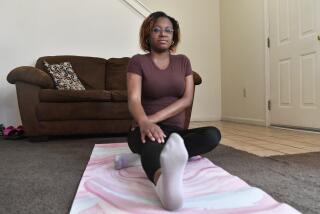New Drug Shows Promise Against Multiple Sclerosis : Medicine: The substance reduces flare-ups of the disease by nearly one-third with limited side effects, study finds. Its manufacturer will apply for federal marketing approval.
- Share via
Multiple sclerosis patients may soon have a new drug that is nearly as effective as the recently approved beta-interferon but has far fewer side effects.
Preliminary results from a clinical trial show that the drug, called copolymer one, reduces flare-ups of the disabling disease by nearly one-third, the drug’s discoverer said Sunday at an MS symposium at Cedars-Sinai Medical Center. The drug’s manufacturer will apply to the Food and Drug Administration this week for marketing approval, immunologist Ruth Arnon of the Weizmann Institute of Science in Rehovot, Israel, told the meeting.
More than 350,000 Americans suffer from MS, and beta-interferon, which became available only last summer, is now the only effective treatment.
Scientists are particularly happy about the new drug because it has a different mechanism of action from beta-interferon. “The two medications deal with the disease in entirely different ways,” Arnon said. “We think it is possible that, when used together, they will have a combined, and even synergistic, effect.”
“From our perspective, this is terrific,” said Dr. Stephen Reingold, vice president of research and medical programs at the National Multiple Sclerosis Society. “What we are facing is the possibility that people will have . . . alternative treatments in the future.”
The drug could receive approval in as little as a year, experts predict, and is already being given to about 2,500 MS patients in the United States on a “compassionate” basis. The FDA sometimes allows promising drugs to be given to selected patients before formal approval.
Multiple sclerosis is a progressive disease of the central nervous system that is produced when, for reasons still unknown, the body’s immune system attacks the protective myelin sheaths surrounding nerve fibers. The process is much like scraping insulation off an electrical wire, short-circuiting the transmission of nerve impulses that control muscle activity.
MS patients can suffer loss of balance and muscle coordination, blurred vision and slurred speech, difficulties in walking and even paralysis in severe cases. MS affects twice as many women as men, and two-thirds of all cases develop when the victim is between the ages of 20 and 40.
Both beta-interferon and copolymer one, which will be marketed in this country by Lemmon Co. under the trade name Copaxone if the FDA approves it, are most effective in a subgroup of patients with so-called exacerbating-remitting MS. In this condition, which afflicts about 30% of MS patients, symptoms subside totally or partially after a flare-up. The flare-ups are followed by periods of stability that can last months or years.
In the more common form of the disease, symptoms gradually worsen. Arnon said that copolymer one provides some benefits in patients with this form of the disease as well, but that it has not yet been tested on them in clinical trials.
In the just-completed clinical trial, headed by Dr. Kenneth Johnson of the University of Maryland Medical Center, 125 patients with exacerbating-remitting MS injected themselves daily with copolymer one, while 126 injected a placebo.
Preliminary results indicate that 210 flare-ups occurred over a two-year period in the patients who received the placebo, compared to 160 among those who received the drug, Arnon said. The best results were obtained in patients in the earliest stages of the disease, she said, and the results continued to improve the longer a patient was on the drug.
Arnon also described results from a so-called open trial on 300 MS patients in Israel. In an open trial, no placebo is used. The 300 patients each averaged 1.3 exacerbations in the two years before the trial, but only 0.5 exacerbations during the two years they were receiving the drug. Nearly half of the patients, 49%, required hospitalization in the two years before the trial, compared to only 17% during the trial.
One patient who is happy about an alternative is Debbie Bader, 35, a graduate of UCLA Law School who worked for Mickey Kantor, currently U.S. trade representative, and former Sen. Alan Cranston before she was diagnosed as having MS six years ago.
Bader’s condition deteriorated dramatically within two years after diagnosis and she was hospitalized frequently, said her mother, Rhoda Bader. “She couldn’t sit up or stand up, she couldn’t feed herself, she had body tremors and difficulty speaking,” she said. Her mental powers also waned. “I couldn’t even explain to her how to use the remote control on a television.”
Four years ago, Debbie Bader began receiving copolymer one on a compassionate basis. After a year on the drug, she began to improve. Today, her mother says, she has normal strength in her arms and legs, lives alone and has an active social life. Although she is teaching English to a Russian man, she doesn’t work full-time yet because of continuing problems with short-term memory--she sometimes has to write someone’s name down on paper to keep from forgetting it, for example.
More on Medicine
* Articles on the latest medical research covering everything from cholesterol to cancer are available on the TimesLink on-line service. Sign on and “jump” to keyword “medicine.”
Details on Times electronic services, A6






